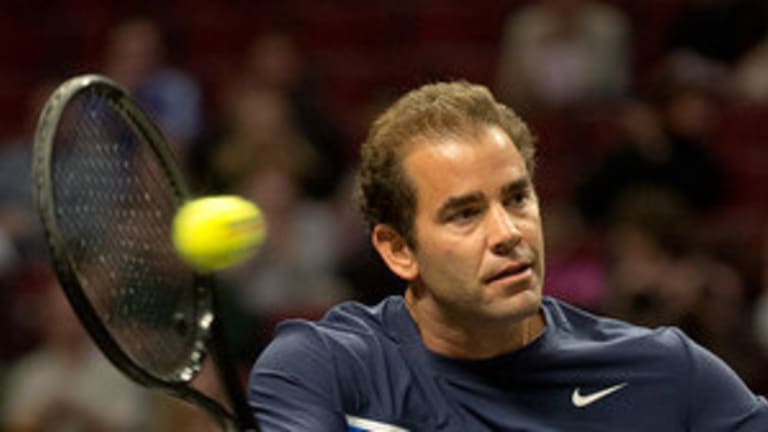Pete Sampras doesn’t let a little thing like retirement stop him from playing competitive tennis. Last night, he hooked up with fellow retirees John McEnroe, Ivan Lendl and Jim Courier for the PowerShares Series’ second stop in Chicago.
Even at 41 years young, the Pistol can still rip monster serves, but last night he landed far too many double faults to hold off a feisty John McEnroe in the finals. Serving but down 4-7 in the eight-game pro set, Johnny Mac charged back and swept the next four games to claim the Chicago title in a tiebreaker.
Before the match, I caught up with Pete to get his thoughts on the state of the ATP tour, his own game and the secret to Paul Annacone’s success.
Q: What are your hopes for the PowerShares Series? Do you think it could be like golf’s Champions Tour where you guys are competing for senior Grand Slams?
Well, I don’t know if we’ll get to the majors. I think we’re just trying to get a tour going to see four great players from different generations. It’s an exciting time. If it were ever to get to a major—I’m not sure that the goal is even to do that. I think it’s just to have some fun and see some different personalities, see some different games. We did it last year and it was pretty successful and now we’re doing it this year, so obviously it’s working.
Q: How seriously do you take these matches?
I’m trying to win. We’re all competitive, and I think our egos get in the way here, but at the same time we want to make sure it’s entertaining, that people enjoy it, that they get their money’s worth. But they want to see good tennis, it’s not just a hit-and-giggle. It is serious tennis. So I prepare. In the last few weeks I’ve been hitting balls and working on my game a little bit and making sure my body can handle the pounding.
Q: In 2008, you played Roger Federer in an exhibition at Madison Square Garden. That was a competitive match! Do you think you could still play on tour?
No, no, no. I mean, there were a few years after I retired where I thought maybe I could play a little bit longer but, no, I’m 41 and the last three to four years I’ve really been feeling the effects of Father Time. I’m not moving as well, my body’s not as limber, the game’s obviously much younger—these guys are 25, 26. The rallies are a lot longer, more physical. So I think if I just play with these guys here tonight [Ivan Lendl, McEnroe, Jim Courier], that’s plenty for me.
Q: A few days ago, Novak Djokovic said he thinks he’s probably playing in the best era of all time. You played in a pretty good era yourself. How do you compare the two? Can they be compared?
It’s tough to compare the generations. I don’t think I’ve ever seen four guys dominate as much as they have, like this generation. I feel like, in my time, there were so many other players winning majors: you had [Boris] Becker, [Stefan] Edberg, myself. There were probably twelve guys that could win. Now, the top four guys are the only ones who have the majors. It’s just very top-dominant. Which generation’s better? Who knows. Every generation is tough. Novak’s certainly playing great tennis in a very tough generation, with [Rafael] Nadal being one of the greats, Roger being one of the greats, and now [Andy] Murray stepping up. Listen, it’s apples and oranges. Every generation is a little bit different; it’s hard to compare the eras.
Q: But how much weight do you give to the slower surfaces, the new technology? It seems unlikely that these four guys could dominate your generation’s faster courts with the same consistency.
I think technology has helped. They can get a lot of power from the backcourt, and they play a lot of long rallies. Certainly my generation had a lot of serve-and-volleyers. I don’t think these guys want to see serve-and-volleyers. I think they like grinding from the backcourt, and to see someone like myself or Becker come in makes them uncomfortable. I’m not saying they couldn’t beat us, but to see some different play is exciting, and I think it gives them something to think about. The way they’re playing today with these grueling rallies, they’re great players, it’s fun to watch. But for my personal choice, I’d like a little variety, some serve and volley, but those days are probably over.
Q: This year, your former coach Paul Annacone helped Roger win his 17th major at Wimbledon after a two-year drought. What makes him such a special coach?
Paul’s a good judge of character. He can see my personality and figure out what to say. He knows how great players think and feel. He’s a smart coach; he knows what to tell his guy—not too much information, but enough to go out there with a good game plan. He knows what other players don’t want to see against you. He’s just good at figuring out different personalities—he can work with [Andre] Agassi, Roger, me. He’s like a chameleon. And I think that’s the mark of a great coach.
*
John Ziza is a writer living in Chicago. Follow him on Twitter [@JohnZiza.]
—Jonathan Scott (@jonscott9)
